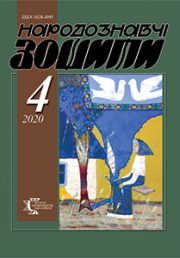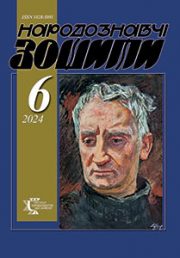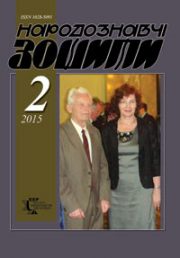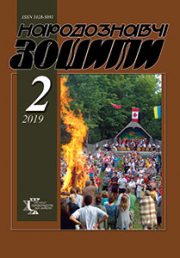The Ethnology Notebooks. 2025. № 5 (185), 1153—1167
UDK94:329.7]:[343.261-052:323.28](477)”19″
DOI https://doi.org/10.15407/nz2025.05.1153
THE PATH TO UKRAINIANISM. TO THE 100TH ANNIVERSARY OF THE BIRTH OF AFANAS ZALIVAKHA
SAPELYAK Oksana
- ORCID ID: https://orcid.org/0000-0001-8111-65
- Candidate of Historical Scientes, Senior Research Associate,
- Institute of Ethnology of the National Academy
- of Sciences of Ukraine, Department of Modern Ethnology,
- Active Member of the Shevcheko Scientific Society,
- 15, Svobody Avenue, 79000, Lviv, Ukraine,
- Contacts: e-mail: oksana.sapelyak@gmail.com
Abstract. The study of the traditional culture of Ukrainians is focused mainly on issues of material culture. Considerable attention is paid in modern science to the study of the spiritual and religious life of the people, folk knowledge, and rituals.
The purpose and objectives of the article are to examine the Ukrainian Resistance movement of the mid-20th century, that is, the Sixties as a national spiritual tradition of the struggle for national freedom, an independent state in conditions of enslavement for centuries.
Under the conditions of a totalitarian regime, when the very concept of national identity was being liquidated, when slavish disenfranchisement became the norm of existence, the tradition of the struggle for freedom, law and justice, and national culture manifested itself in the activities of the Sixties.
The object of this study is the Sixties Resistance movement, the subject is the life path of the artist Afanas Zalivakha.
Keywords: Resistance movement, sixties, Afanas Zalivakha, political prisoners, self-awareness, samizdat, Ukrainianism.
Received 22.09.2025
REFERENCES
- Zalyvakha, O. (2024). Letters to Halyna Sevruk. 2003. Return. Afanas Zalyvakha in memories, letters, archives, documents (Pp. 107—115). Ivano-Frankivsk [in Ukrainian].
- Koshelivets, I. (1963). Panorama of the latest literature in the Ukrainian SSR. Munich [in Ukrainian].
- Koshelivets, I. (1964). Modern literature in the Ukrainian SSR. Munich [in Ukrainian].
- Koszeliwec, Iwan. (1969). Ukraina 1956—1968. Paris: Instytut Literacki [in Polish].
- Svitlychny, I. (1977). Gratovani sonneti. New York: Suchasnist Publishing House [in Ukrainian].
- Sverstyuk, E., & Koszeliwec, I. (1979). Selected Works. Munich: Suchasnist Publishing House [in Ukrainian].
- Koszeliwec, I. (2000). Shestidesyatnyki. Encyclopedia of Ukrainian Studies (Vol. 10, pp. 3847—3849). Lviv [in Ukrainian].
- Kravtsiv, V. (1962). «The Great Dipper» and «Hound Dogs» (Part 2).
- Munich: Suchasnist [in Ukrainian].
- Kravtsiv, B. (1967). Sixty Poets of the Sixties. Anthology of New Ukrainian Poetry. Munich [in Ukrainian].
- Drozdovsky, D. (2006). The Code of the Future. Philosophy of the Ukrainian Sixties: Monograph. Kyiv [in Ukrainian].
- Mokryk, R. (2023). Revolt against the Empire: Ukrainian Sixties. Kyiv [in Ukrainian].
- Zaretsky, O., & Marychevsky, M. (Ed.). (1996). Alla Horska. The Red Shadow of the Viburnum. Letters, Memories, Articles. Kyiv: Spalah [in Ukrainian].
- Zaitsev, Yuri. (2024). Ivan Gel. Interviews, Documents, Works, Memories. Lviv: Institute of Ukrainian Studies named after I. Krypyakevych NAS of Ukraine [in Ukrainian].
- Lytvyn, Halyna, & Mecheva, Oleksandra.(2024). Return. Afanas Zalivakha in memories, letters, archives, documents. Ivano-Frankivsk [in Ukrainian].
- Ovsienko, V. (2024). Interview with Afanas Zalivakha. Return. Afanas Zalivakha in memories, letters, archives, documents (Pp. 168—211). Ivano-Frankivsk [in Ukrainian].
- Zalivakha, O. (1999, 2024). As if in the temple of God. Bagattya. Borys Antonechko-Davydovych through the eyes of contemporaries (Pp. 225—228); Return. Afanas Zalivakha in memories, letters, archives, documents (Pp. 57—60). Kyiv; Ivano-Frankivsk [in Ukrainian].
- Zalyvakha, O. (2024). Speech at the funeral of Ivan Honchar (1993). Return. Afanas Zalyvakha in memories, letters, archives, documents (P. 72). Ivano-Frankivsk [in Ukrainian].
- Zalyvakha, O., Zaretsky, O., & Marychevsky, M. (Eds.). (1996, 2024). Ascension. Alla Horska. The Red Shadow of the Viburnum. Letters, memories, articles; Return. Afanas Zalyvakha in memoirs, letters, archives, documents (Pp. 164—167). Kyiv: Spalah; Ivano-Frankivsk [in Ukrainian].
- Zalyvakha, O. (2024). Letters to Alla Gorska. Return. Afanas Zalyvakha in memories, letters, archives, documents (Pp. 97—105). Ivano-Frankivsk [in Ukrainian].
- Zalyvakha, O. (2024). «Powder» and the Holy Spirit. Artania. 2010, 1 (Book 18, pp. 23—24); Return. Afanas Zalyvakha in memories, letters, archives, documents (Pp. 70—71). Ivano-Frankivsk [in Ukrainian].
- Koterlin, R. (2000). «Uncultivated and under-revived, because barren». Return (Pp. 228—239). Ivano-Frankivsk [in Ukrainian].
- Stefurak, N. (2024). Here are my spiritual roots. «Halychyna» city. 30.11.1995; Return. Afanas Zalivakha in memories, letters, archives, documents (Pp. 216—219).Ivano-Frankivsk [in Ukrainian].
- Zalivakha, O. (2001, 2024). Knight of the Ukrainian idea. Lesya Bodnaruk. Mykhailo Soroka; Return. Afanas Zalivakha in memories, letters, archives, documents (Pp. 55—56). Drohobych; Ivano-Frankivsk [in Ukrainian].
- Kipiani, V., Ovsienko, V., & Zaitsev, Yuri. (2024). Interview with Ivan Gel. Ivan Gel. Interview, documents, works, memories (Pp. 192—263).Lviv: Institute of Ukrainian Studies named after I. Krypiakevych NAS of Ukraine [in Ukrainian].
- Zalivakha, O. (1998, 2024). Dobrooky. Memories of Ivan Svitlychny (Pp. 200—205); Return. Afanas Zalivakha in memories, letters, archives, documents (Pp. 37—42). Kyiv; Ivano-Frankivsk [in Ukrainian].
- Gel, I. (1993). Edges of Culture. Lviv [in Ukrainian].
- Zalyvakha, O. (1992, 2024). With faith and love (preface). Lesiv Ya. TT. (prison silence); Return. Afanas Zalyvakha in memories, letters, archives, documents (Pp. 61—62). Ivano-Frankivsk [in Ukrainian].
- Lesiv, Ya., & Svitlychna, Nadiya. (1982). Myt. Poems from prison. New York [in Ukrainian].







